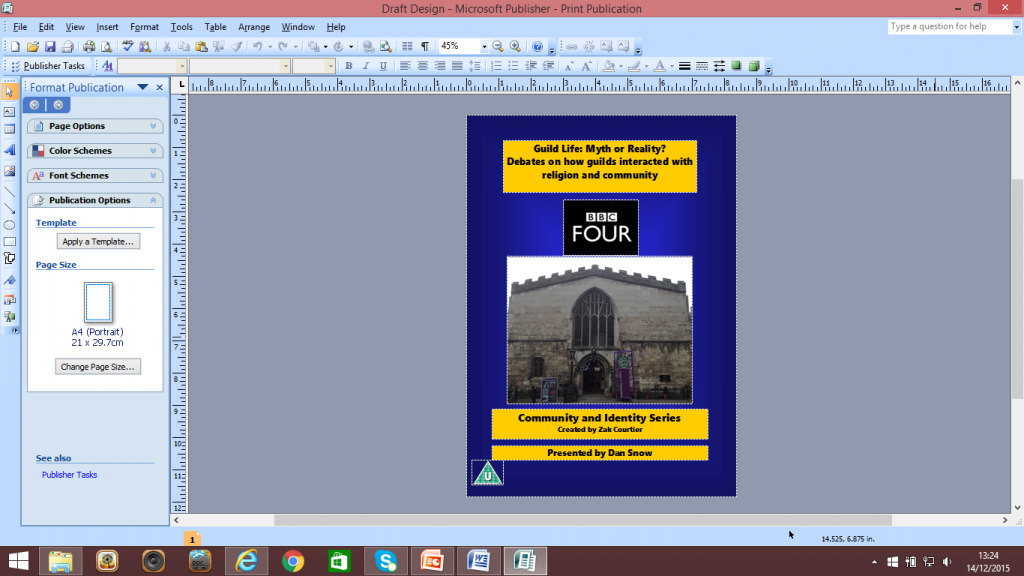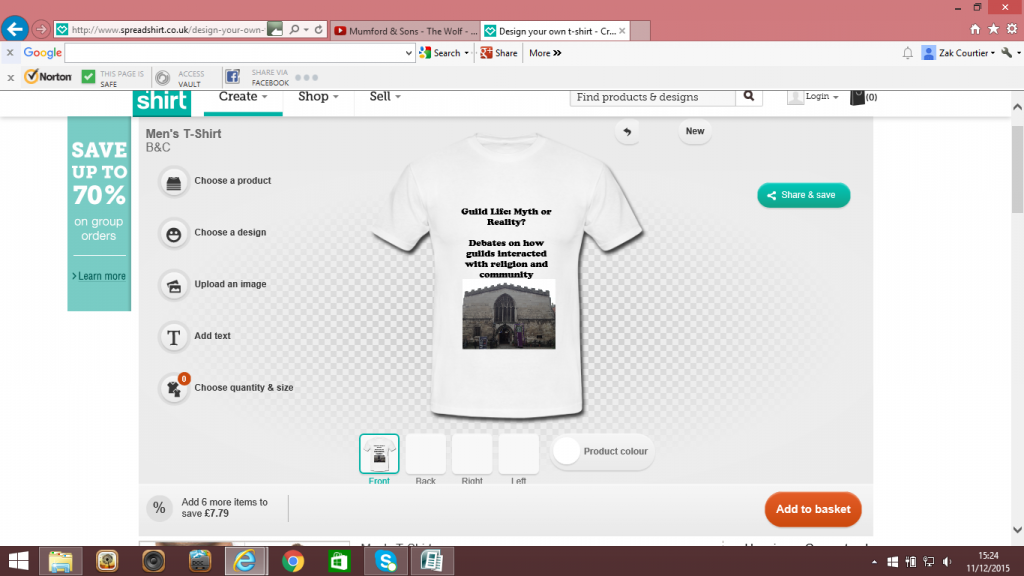Zak Courtier is a Year 3 History student who has just completed the assessment for a third year module (taught by Dr. Patricia Cullum) which is designed to help students think about how they can present their academic work to a wider audience.
When choosing which modules to take for my third year history studies, ‘Community and Identity in the Middle Ages’ really stood out for me as it wasn’t your standard history module. Rather than studying a specific time period or event, we would instead study identities; both individual and communal in Medieval society. A person’s identity could be shaped by their gender, religion, sexuality or status. Individuals could be part of numerous types of identity and therefore one category may have taken more importance than another. Specifically, we would study what effects religion and gender had on a person’s overall identity and the relationships between the different forms of identity.
The other unique part of the module was the fact that one of the assessments was in the style of a television pitch to the BBC for our idea for an episode of a documentary series to be commissioned. We would pitch an idea for part of a ‘Community and Identity’ series for BBC4 where we would study one aspect of Medieval Identity and how it related to ideas of gender or religion at the time. This was exciting as it gave you the creative freedom to do something outside of the box and was not just a series of essays to be assessed.
We had to base our documentary idea on primary sources and bring knowledge of the wider historical debates of the topic to the viewer to both entertain and educate. My idea for a documentary was on ‘Medieval English Guilds and their interactions with Community and Religion’. The episode would have been called ‘Guild Life: Myth or Reality?’ I was inspired by the presence of guilds in modern culture such as through Terry Pratchett’s Discworld novel series and the guilds in the Assassins Creed video game series. Guilds had become part of popular culture yet when I undertook a survey among my friends and family, only one person out of twenty knew what their role had been in medieval society. I felt that this topic would be one that was both relevant to a modern audience as well as fill a gap in public knowledge.

As part of the pitch, we had to include ideas on both the current historical debate of our topic as well as more creative aspects of the documentary itself such as cast, location and format. This allowed us to think economically in terms of audience ratings, costs and appeal as well as historically by making sure the show would be able to shed light on a particular historical debate or idea. It also allowed me to visit York and its Medieval Guild Hall and Merchant House with other students as part of a research trip that we organised to better immerse ourselves into the project as we scouted out potential locations for our show. With York famed for the history and popularity of its guilds, it also helped to increase my understanding of my wider historical topic.
My documentary looked at whether the role of medieval guilds in society as economic, communal and charitable cornerstones of the community has been exaggerated in records and therefore what role they actually played in Medieval society. Using the Ordinances on guilds by Richard II in 1389 at a time where English guilds were prosperous both in terms of quantity and wealth as the basis of my documentary, I chose to have Dan Snow as an impartial referee between the two sides of the historical debate for the viewer to hear each side of the argument and view recreations of guild life and ceremony to decide themselves where they stood on the controversy by the end of the show. From choosing composers for the music, to deciding to use re-enactment societies and Preston Guild’s 800th anniversary as a modern interpretation of guild life, this module had me combine historical understanding with the motivations and requirements of television producers and writers to come up with a legitimately historical, as well as commercially viable, topic for the BBC to produce. It also allowed me to think in a business sense, producing mock ups of promotional material for the show as seen here by t-shirt merchandise as well as key rings, business cards and other material to bring another level to my pitch.

By pretending to bring a more nuanced and obscure historical topic to a modern audience in a hopefully interesting and unique way, we have learnt to combine history with the entertainment business to practice new skills and better prepare us for life after university as part of a unique and enjoyable module. The scope of creativity allowed had us put in lots of extra effort to come up with an interesting and confident pitch, as if we really were competing between us to have our show commissioned. I am currently on standby, with my phone to hand just in case the BBC catches wind of my idea and needs me to advise them on any future projects!
History at Huddersfield utilises research-led teaching and a commitment to public engagement to ensure that what we do is both useful to society and beneficial to the employability of our students. We see our students as researchers – partners in the development of knowledge with academic staff, often through co-production of knowledge with community partners. For more information see http://www.hud.ac.uk/courses/full-time/undergraduate/history-ba-hons/ and http://www.hud.ac.uk/research/history/
You can email us at historyadmissions@hud.ac.uk
